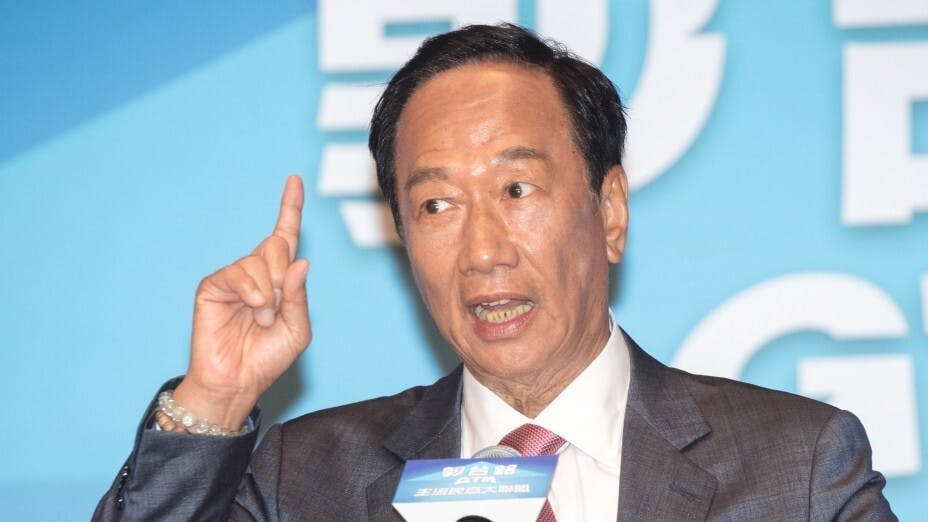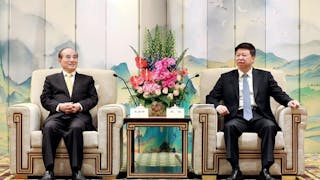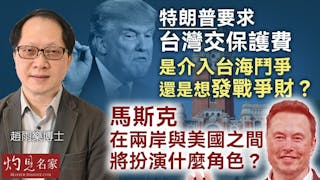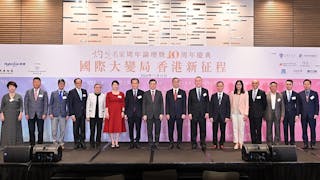儘管鴻海創辦人郭台銘最近宣布參加台灣2024年總統選舉,並不令人意外,但他的舉動已經損害了台灣政壇非綠陣營的團結,尤其是如果郭台銘、國民黨的侯友宜和民眾黨的柯文哲難以達成政治妥協的話,民進黨候選人賴清德就很可能會輕易獲勝。
郭台銘在公開聲明中聲稱,他希望組建一個廣泛的非綠聯盟,以團結選民「下架民進黨」。但是,要實現這樣的聯盟,郭台銘、侯友宜和柯文哲必須解決幾個問題。
欲組在野聯盟 要解決什麼問題?
首先,郭台銘及其智囊可能想以民意為籌碼,推動組建非綠或藍白聯盟,對抗民進黨領導的綠營。然而,台灣大眾傳媒的民意調查顯示,郭的支持率很低,其受歡迎程度低於侯友宜和柯文哲,位居第三。
正如郭台銘在記者會上所說,如果他的支持率仍然很低,他很難通過邀請侯友宜和柯文哲「喝咖啡」的方式達成共識。
最重要的是,台灣不少網民對郭台銘的參選反應相當負面,其中一些人表示,像郭台銘這樣的富商應該支持國民黨候選人,而不是向藍營吐口水。其他批評郭台銘的人指出,郭台銘有可能吸引一些支持柯文哲的選民,從而導致賴清德領導的民進黨輕鬆贏得2024年1月總統選舉的雙輸局面。
其次,目前還不知道郭台銘的參選,如何能夠凝聚既非國民黨核心支持者,也不是民進黨選民的溫和派選民。換句話說,溫和派選民可能會認為郭台銘過於「親大陸」,而不是認為他是一個能夠而且會消弭兩岸衝突可能性的候選人。如果一些溫和派選民認為郭台銘太「深藍」,那麼他的參選可能會削弱國民黨侯友宜的機會。
第三,除非郭台銘想以公開宣布參加2024年總統選舉為手段,激發民眾的興趣,動員選民投票,但是他仍需通過約28萬選民簽名的門檻,才能獲得提名。批評者已經質疑台灣市議會中一些地方選舉產生的議員是否真的會追隨郭台銘。一些議員已表示打算撤回對郭台銘的支持。如果是這樣,郭台銘的參選反而疏遠了他的支持者,而不是鼓勵了他們。
第四,民進黨方面似乎對郭台銘的參選可能刺激非綠陣營崛起的可能性持謹慎態度,因此提高了警惕,同時加大了動員綠營支持者的力度。在這種情況下,郭台銘的聯合執政主張和他的參選,已經提高了民進黨的敏感度,甚至增加了綠營的選舉成功機會。民進黨智庫絲毫沒有放鬆,郭台銘的參選已經觸動了民進黨核心領導人的神經。
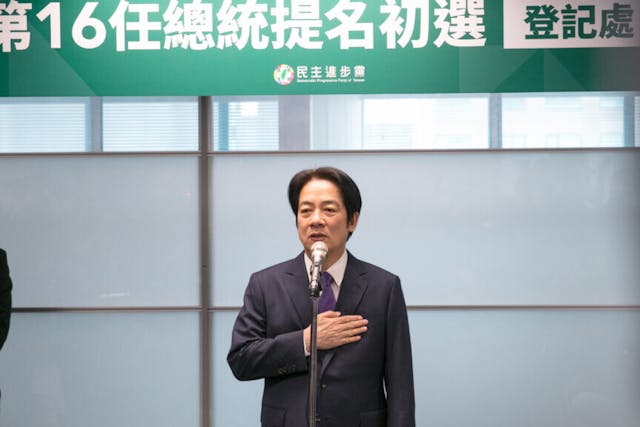
台灣大選可能出現3種情況
郭台銘參與2024年台灣總統選舉存在以下3種情況:
首先,郭、侯、柯3位非綠陣營候選人無法達成共識,民進黨的賴清德將輕鬆獲勝。如果郭台銘和柯文哲堅持他們的立場而不作出任何妥協,尤其是如果民意調查的結果無法說服他們3人中的任何一或兩個人退出選舉,那麼這種情況便很可能發生。
第二種情況是,郭台銘最終可能會因支持率較低而選擇退出,目前看來這種可能性不大。對於見證是否有非綠陣營候選人選擇退出,未來幾個月更為關鍵。侯友宜肯定會參選,因為他是由國民黨提名的,尤其是郭台銘被許多批評者和國民黨支持者視為「違背了先前不參選的承諾」。但如果郭台銘選擇退出,侯友宜和柯文哲仍會爭奪溫和派選民的支持,分裂藍白陣營選民,從而有利賴清德贏得選舉。目前的民意調查顯示,賴清德領導的民進黨可獲得30% 至40%的選票,這一數字領先於所有其他3位非綠陣營候選人。
第三種情況是郭、侯、柯3人達成妥協,只有一名候選人代表非綠聯盟。然而,由於柯文哲代表民眾黨,這種情況將相當困難。要求柯文哲退出選舉既不合邏輯也不切實際。同樣,侯友宜代表國民黨陣營,也不可能要求他退出。因此,目前尚不清楚郭台銘是否會說服侯友宜和柯文哲結成聯盟,而郭台銘本人則退出競選。在非常理想的情況下,郭、侯、柯3人達成共識,只有一人代表非綠陣營,那麼賴清德的勝算就會受到嚴重削弱。
從上述分析來看,第一種和第二種情況有利於民進黨的賴清德。只有第三種情況才有可能出現賴清德敗選的情況。
非綠陣營很難輕鬆獲勝
總而言之,郭台銘參加2024年初的台灣總統選舉,可以被視為國民黨內部的傳統分裂──對於「主流民意大聯盟」的出現,或者3位非綠陣營候選人達成任何妥協的前景都是悲觀的。只能選擇其中一人參選。除非郭台銘的目標是在他、侯、柯之間達成真正的共識,否則很難看到非綠陣營輕鬆獲勝。
民進黨執政台灣多年,其在兩岸關係上的強硬立場,似乎得到許多台灣選民尤其是年輕一代的支持。因此,除非郭台銘本人選擇退出競選,或者他真的能在3位非綠候選人之間達成妥協,否則目前台灣政治的發展表明,民進黨在2024年總統選舉中獲勝的可能性很大。2023年底可能是台灣2024年總統選舉中最關鍵的時期,因為如果有候選人選擇退出,那麼非綠陣營就會出現一線希望。儘管如此,讓兩名候選人爭奪溫和派選民,仍可能不足以讓非綠陣營擊敗相對強大的民進黨。
Terry Guo’s electoral participation and implications for Taiwan politics
Although the recent announcement of business tycoon Terry Guo to participate in the 2024 presidential elections in Taiwan was not surprising, his move has already damaged the unity of the non-green camp in Taiwan politics, pointing to the likely easy victory of William Lai, the candidate representing the Democratic Progressive Party (DPP) especially if there would be difficulties in reaching a political compromise between Guo, Hou You-yi of the Kuomintang (KMT) and Ko Wen-je of the People’s Party.
Terry Guo in his public announcement asserted that he would like to form a broad non-green coalition to unite the voters against the DPP. However, there are several problems that he, Hou You-yi and Ko Wen-je would have to tackle if such a coalition can be realized.
First, Terry Guo and his think tank may want to use public opinion polls as a bargaining chip to propel the formation of a non-green or blue-white coalition against the green camp led by the DPP. Nevertheless, opinion polls shown in the Taiwan mass media have displayed a low rating of Guo, whose popularity is the third trailing behind Hou and Ko.
If Guo’s popularity remains low, it would be difficult for him to reach a consensus with Hou and Ko over a cup of coffee, as he said in his press briefing.
Most importantly, a lot of netizens in Taiwan have reacted quite negatively to Guo’s participation, with some of them saying that rich businesspeople like him should support the KMT to have one candidate rather than spitting the blue camp. Others critical of Guo point to his likelihood of grasping some voters supportive of Ko Wen-je, thereby leading to a lose-lose situation in which the DPP led by William Lai would win the presidential election in January 2024 easily.
Second, it is unclear how Guo’s electoral participation will really rally the moderate voters who are neither the core supporters of the KMT nor the voters of the DPP. In other words, the moderate voters may see Guo as being too “pro-mainland” rather than seeing him as a candidate who can and would minimize the conflicts between the mainland and Taiwan. If some moderate voters see Guo as being too “dark blue,” then Guo’s participation may hurt the chance of Hou You-yi of the KMT.
Third, unless Guo wants to use his public announcement of participation in the 2024 presidential elections as a stimulus to trigger the interest of citizens and to mobilize the voters to cast their ballots, he would still have to pass the hurdle of some 280,000 voters’ signatures first to get nominated. Critics have already questioned whether some locally elected councilors in Taiwan’s municipal councils would really follow Guo. Some councilors have expressed their intention of withdrawing their support of Guo. If so, Terry Guo’s electoral participation alienates his supporters rather than galvanizing them.
Fourth, the DPP side appears to be cautious of the possibility that Guo’s participation would stimulate the rise of a non-green coalition, and, as such, it has increased vigilance while enhancing campaign efforts at mobilizing the green camp’s supporters. Under these circumstances, Terry Guo’s claim of forming a coalition and his participation have already heightened the sensitivity of the DPP and even enhanced the green camp’s chance of electoral success. The DPP think tank is by no means relaxed and Guo’s participation has already alarmed its core leaders.
There are three scenarios of Guo’s participation in Taiwan’s presidential elections in 2024.
The first is that none of the three non-green candidates – Guo, Hou and Ko – would be able to reach a consensus and the result would be an easy victory for William Lai from the DPP. This scenario would be quite likely if Guo and Ko maintain their stance without making any compromise, especially if public opinion poll results would not be able to convince any one or two of the three to opt out from electoral participation.
The second scenario is that Guo may eventually opt out due to low popularity rating, which at present seems unlikely as the coming months will be more crucial in witnessing whether any non-green candidate would opt out. Hou will certainly stand as he was nominated by the KMT, especially as Guo is seen by many critics and KMT supporters as a person “breaking his earlier promise” of not participating in the 2024 elections. Yet, if Guo opts out, Ko and Hou would still divide up the voters from the blue and white camps, competing for the support of moderate voters and thereby favoring William Lai to win the election. Current polls show that Lai’s DPP garner between 30 and 40 percent of the votes – a figure leading all the other three non-green candidates.
The third scenario is that there will be a compromise among Guo, Hou and Ko to have only one candidate representing the non-green coalition. However, this scenario will be quite difficult as Ko represents the People’s Party. Asking Ko to withdraw from the elections would be illogical and impractical. Similarly, Hou represents the KMT camp, and it is impossible to ask him to withdraw. It is therefore unclear whether Guo would persuade Hou and Ko to come together as a coalition while Guo himself withdrawing from the contest. But under a very ideal situation in which Guo, Hou and Ko would reach a consensus that only one of them would represent the non-green camp, then William Lai’s chance of victory will be undermined severely.
From the analyses above, scenarios one and two would favor William Lai of the DPP. Only scenario three would envisage Lai’s defeat.
In conclusion, Terry Guo’s participation in the presidential elections of Taiwan in early 2024 can be seen as a traditional split within the KMT – a gloomy scenario for the emergence of a coalition or the coming of any compromise in which the three non-green candidates would select only one of them to run in the contest. Unless Guo aims at bringing about a real consensus between him, Hou and Ko, it is quite difficult to witness an easy victory of the non-green camp.
The DPP has been governing Taiwan for some years and its hardline position on cross-strait relations appears to get the support of many Taiwan voters, especially the younger generation. As such, unless Terry Guo himself opts out of the electoral contest and unless he can really bring about a compromise among the three non-green candidates, the current developments in Taiwan politics are pointing to the likelihood of the DPP victory in the 2024 presidential elections. The end of 2023 will likely be the most critical period in Taiwan’s 2024 presidential politics because, if any candidate opts out, then a glimmer of hope for the non-green camp would emerge. Still, having two candidates competing for moderate voters would likely be inadequate for the non-green camp to defeat the relatively strong and incumbent green camp.
原刊於澳門新聞通訊社(MNA)網站,本社獲作者授權轉載。原文網址:https://www.macaubusiness.com/opinion-terry-guos-electoral-participation-and-implications-for-taiwan-politics/



